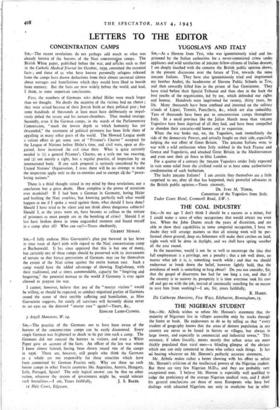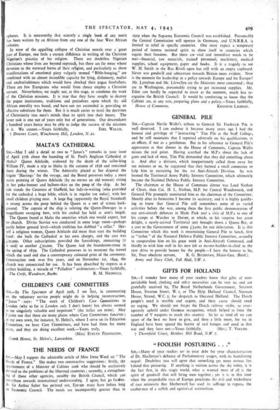THE NIGERIAN STUDENT
SIR,—Mr. Ajibola wishes to refute Mr. Henson's statement. that the majority of Nigerians live in villages accessible only by tracks through the forest or bush. He endeavours to do so by telling us that " every student of geography knows that the areas of densest population in any country are never to be found in forests or villages, but always in large towns, and especially in commercial and industrial towns." This sentence, if taken literally, means merely that urban areas are more thickly populated than rural ones—a blinding glimpse of the obvious which one can only commend to those who collect such things. It has no bearing whatever on. Mr. Henson's perfectly accurate statement.
Mr. Ajibola makes rather a better showing with his effort to refute Mr. Henson's criticism of the intellectual powers of the Nigerian student. But there are very few Nigerian M.D.s, and they are probably very exceptional men. I believe Mr. Henson is especially well qualified to judge the proficiency of the average Nigerian medical man, and I think his general conclusions are those of most Europeans who have had dealings with educated Nigerians not only in medicine but in other
spheres. It is noteworthy that scarcely -a single book of any merit has been written by an African from any one of the four West African colonies.
In view of the .appalling, collapse of Christian morals over a " great part of Europe, one feels a certain diffidence in writing of the Christian Nigerian's practice of his religion. There are doubtless Nigerian Christians whose lives are beyond reproach; but there arc far more whose devotion to the outward forms of their religion, and particularly to those manifestations of emotional piety vulgarly termed "Bible-banging," are combined with an almost incredible capacity for lying, dishonesty, malice and uncharitableness which would have shocked their pagan forefathers. There are few Europeans who would from choice employ a Christian servant. Nevertheless, we ought not, at this stage, to condemn the work of the Christian missions. It is true that they haVe sought to destroy the pagan institutions, traditions and prejudices upon which the old African morality was based, and have not yct succeeded in providing an effective substitute for them. But it is much easier to instil the doctrines of Christianity into men's minds than its spirit into their hearts. The latter task is one not of years only but of generations. Our descendants a hundred years hence may be able to judge the success of the missions in it. We cannot.—Yours faithfully, - EREL WALLIS. 7 Downes Court, Winchmore Hill, London, N.21.



























 Previous page
Previous page